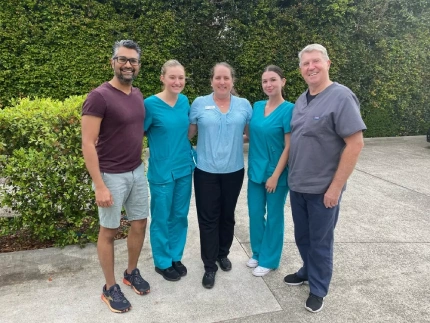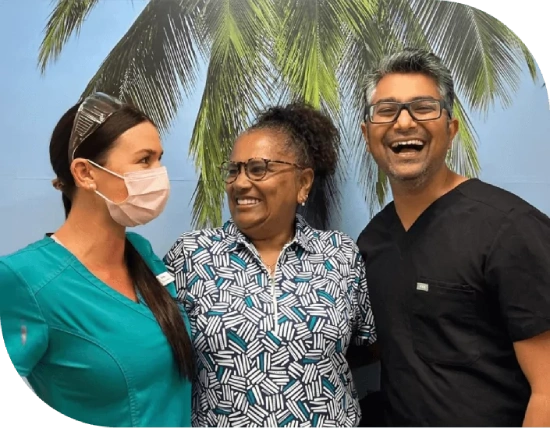
Dentist Woombye
Our practice boasts over 20 years of providing
high-quality dental solutions.



Find Comprehensive Dental Solutions for Families at The Smile Workx
At The Smile Workx, we excel in providing gentle, comprehensive dental care tailored to individual needs.
Our commitment is to ensure that every visit is as comfortable and thorough as possible.
Nestled at 48 Mary Street in Noosaville, our clinic boasts convenient off-street parking and is equipped with wheelchair access, making visits easy for all our patients.
From routine dental check-ups to more intricate procedures, we offer a wide range of dental services designed to address the oral health needs of the whole family.
Our clinic is designed for comfort, creating a calm, anxiety-alleviating atmosphere.
Our Special Offers

Check-up & Clean $62.25/week* or $249
⚫ Scale & Clean
⚫ Gum Health Assessment
⚫ Refreshing Fluoride
⚫ New patient hygiene gift
⚫ New patients Only
Health fund rebates available!
⚫ All x-rays included

Kids Specials $0 out of pocket
⚫ GAP FREE for Under 14 years old, health fund members
⚫ Comprehensive Exam and Consultation
⚫ Scale & Clean with X Rays
⚫ Gum Health Assessment
⚫ Refreshing Fluoride

Dental Implants $35/week*
⚫ Complimentary Consultation (Savings of $55)
⚫ Celebratory post treatment gift: Water Air Flosser (valued at $99)
⚫ New Patient Hygiene Gift
⚫ Flexible payment plans

Orthodontics $83/week*
⚫ Complimentary Smile Consultation
⚫ Bonus gift: Custom retainers (valued at $500)
⚫ Celebratory Gift: Professional Whitening Kit (savings of $460)
⚫ New Patient Hygiene Kit

Smile Makeover Package $87.50*/week
⚫ High Quality-Natural Looking Veneers
⚫ Celebratory Post Treatment Gift - Professional Smile Portraits
⚫ New Patient Hygiene Gift

Custom Sports Mouthguards GAP-FREE or $100
⚫ Highly Durable and Comfortable
⚫ Pick your child’s favourite colour!

Check-up & Clean $62.25/week* or $249
⚫ Scale & Clean
⚫ Gum Health Assessment
⚫ Refreshing Fluoride
⚫ New patient hygiene gift
⚫ New patients Only
Health fund rebates available!
⚫ All x-rays included

Kids Specials $0 out of pocket
⚫ GAP FREE for Under 14 years old, health fund members
⚫ Comprehensive Exam and Consultation
⚫ Scale & Clean with X Rays
⚫ Gum Health Assessment
⚫ Refreshing Fluoride

Dental Implants $35/week*
⚫ Complimentary Consultation (Savings of $55)
⚫ Celebratory post treatment gift: Water Air Flosser (valued at $99)
⚫ New Patient Hygiene Gift
⚫ Flexible payment plans

Orthodontics $83/week*
⚫ Complimentary Smile Consultation
⚫ Bonus gift: Custom retainers (valued at $500)
⚫ Celebratory Gift: Professional Whitening Kit (savings of $460)
⚫ New Patient Hygiene Kit

Smile Makeover Package $87.50*/week
⚫ High Quality-Natural Looking Veneers
⚫ Celebratory Post Treatment Gift - Professional Smile Portraits
⚫ New Patient Hygiene Gift

Custom Sports Mouthguards GAP-FREE or $100
⚫ Highly Durable and Comfortable
⚫ Pick your child’s favourite colour!
Why Choose Us?
Selecting our clinic means you’re choosing a team deeply committed to providing premium dental care with a personal touch. Our skilled and gentle professionals are dedicated to aiding our patients in achieving not only attractive but also healthy smiles, focusing on individual needs and preferences.
As a respected dental practice in Noosaville, we pride ourselves on delivering exceptional care in a welcoming, anxiety-free atmosphere. This dedication has resulted in a loyal patient base, with families trusting us for their dental care over many years.
Whether it’s a child’s first dental examination or an adult with a history of dental visits, our approach is customised to fit the unique dental health needs of each individual.
We believe in a patient-centred approach, ensuring that every treatment is as effective as possible.
Choose The Smile Workx for quality dental care
You can count on our expertise in solving distinct dental issues for families.
- Economical, comprehensive dental treatments available
- Warm, welcoming atmosphere catering to every family member
- Utilisation of the latest dental advancements and techniques
- The skilled and extensively experienced dental team
- A broad spectrum of dental services provided
- Variable payment options to accommodate all budgets
- Child-focused bulk billing available
- Official providers for BUPA, HCF, NIB, and WestFund
- Swift service for immediate dental emergencies
- Tailored appointment times to match individual schedules
- High-quality cosmetic dental options offered
For more information on dental treatments and appointments, schedule an appointment with us at (07) 5300 2133.







Payment Plans Available
What Our Customers Say
Frequently Asked Questions
What are dental implants?
Dental implants represent a significant advancement in the dental industry, offering a long-term solution for replacing missing teeth. Unlike traditional methods such as dental bridges or dentures, implants provide a more durable and natural-looking result. They are designed to blend seamlessly with your existing teeth, enhancing both functionality and aesthetics.
The Composition of Dental Implants
A dental implant consists of three main components: the implant post, the abutment, and the dental crown. The post, typically made from titanium, acts as a replacement for the tooth root and is surgically inserted into the jawbone. The abutment is attached to the post once healing has occurred, and serves as a connector for the final element, the dental crown, which is custom-made to match the colour and shape of your natural teeth.
The Dental Implant Process
The process of getting dental implants usually involves several steps and multiple visits to your dental clinic. Initially, a comprehensive evaluation, including X-rays or CT scans, is conducted to assess bone density and determine the feasibility of implants. If sufficient bone is present, the implant post is placed into the jawbone. This is followed by a healing period known as osseointegration, where the implant fuses with the bone – a process that can take several months.
After successful osseointegration, the abutment is placed, followed by the dental crown. Throughout this period, patients are monitored closely by their dentist to ensure optimal healing and integration of the implant.
Advantages of Dental Implants
Dental implants offer numerous benefits over other tooth replacement options. They function like natural teeth, allowing for normal eating, speaking, and smiling. Implants also prevent bone loss in the jaw, a common consequence of tooth loss, helping to maintain facial structure. Additionally, unlike dental bridges, implants do not require altering adjacent healthy teeth.
Care and Maintenance
Preserving dental implants entails practising regular oral hygiene, which includes brushing, flossing, and scheduling routine dental check-ups. With proper care, implants can last a lifetime, making them a cost-effective solution in the long run. Patients are advised to follow their dentist’s recommendations for care to ensure the longevity of their implants.
What is cosmetic dentistry?
Cosmetic dentistry encompasses a range of dental treatments designed to enhance the visual aspects of the teeth and mouth, improving a patient’s smile and overall facial appearance. This area of dentistry includes procedures such as teeth whitening, application of dental veneers, reshaping of teeth, and closing gaps between teeth. While the primary focus is on improving dental aesthetics, many cosmetic procedures also contribute to improving oral function. The field combines art and science, using advanced materials and techniques to achieve natural-looking results, thereby boosting individuals’ confidence and self-image.
What is a dental emergency?
A dental emergency involves any oral health issue that requires immediate attention from a dental professional. These situations often involve severe pain, bleeding, or trauma that, if left unattended, could result in serious consequences, affecting overall health and well-being. Recognising what constitutes a dental emergency helps in taking timely action and potentially saving teeth or preventing long-term damage.
Common Types of Dental Emergencies
Several scenarios qualify as dental emergencies. These include severe toothaches indicating potential infection, knocked-out or dislodged teeth resulting from accidents, uncontrolled oral bleeding, large fractures or chips in teeth that expose nerves, and abscesses or infections posing serious health risks. Each of these conditions requires prompt dental treatment to alleviate pain, preserve oral structures, and prevent the spread of infection.
Immediate Actions in Dental Emergencies
Immediate response can be crucial in dental emergencies. For instance, a knocked-out tooth has the highest chance of being saved if reinserted within an hour of the accident. Therefore, handling the tooth by the crown, rinsing it without scrubbing, and attempting to place it back in the socket or keeping it moist can be vital steps before reaching emergency dentistry services. Similarly, applying pressure to a bleeding site or rinsing with warm salt water can provide temporary relief in different scenarios.
Preventing Dental Emergencies
Regular dental check-ups and proper oral hygiene can lower the likelihood of dental emergencies. Wearing protective gear during sports and avoiding hard foods can also help prevent dental injuries. However, knowing how to react when a dental emergency occurs remains essential.
Seeking Immediate Dental Treatment
In the event of a dental emergency, contacting a dental clinic immediately for advice and urgent care is critical. Describing the situation accurately to the dental team can help them prepare for immediate treatment upon arrival. It’s important to know the contact details of the nearest emergency dental service and to have a dental first aid kit handy.
What are some effective ways to maintain dental and gum health?
Maintaining optimal dental and gum health is essential for overall well-being. Healthy teeth and gums contribute to a better quality of life, allowing individuals to eat, speak, and smile with confidence. Understanding and implementing effective dental care routines can prevent common problems such as cavities, gingivitis, and periodontitis.
Regular Dental Check-ups
Visiting a dentist regularly is crucial for maintaining dental and gum health. These check-ups allow for early detection and treatment of oral health issues before they escalate. Dentists can also provide professional cleaning to remove plaque and tartar that regular brushing and flossing might miss. Typically, it is recommended to visit the dentist every six months, but your dental professional may suggest a frequency that is more suited to your individual needs.
Proper Brushing Techniques
Brushing teeth thoroughly twice a day with fluoride toothpaste is fundamental in removing dental plaque and preventing tooth decay and gum disease. Prefer a toothbrush with soft bristles and swap it out every three to four months, or if the bristles show signs of wear.
Daily Flossing
Flossing daily is essential to remove food particles and plaque from between the teeth and under the gumline, areas that a toothbrush cannot reach. Regular flossing helps prevent gum disease and tooth decay. If you find traditional floss hard to use, try floss picks or interdental brushes that may be easier to handle.
Healthy Diet and Hydration
A balanced diet rich in vitamins, minerals, and fibre supports dental and gum health. Limit sugary and acidic foods and drinks that can erode tooth enamel and lead to decay. Instead, include plenty of water, fresh fruits, vegetables, and dairy products in your diet. Staying hydrated, especially with water, can help wash away food particles and bacteria and promote saliva production, which is nature’s way of cleaning teeth.
Quitting Smoking and Reducing Alcohol Intake
Tobacco use and excessive alcohol consumption can harm oral tissues, leading to gum disease and oral cancer. Quitting smoking and moderating alcohol intake can significantly reduce these risks and improve overall oral health.
Use of Mouthguards
Wearing a mouthguard during sports or if you grind your teeth at night can safeguard your teeth against injury and wear. Consult with your dentist about custom-fitting mouthguards, which can offer better protection and comfort compared to over-the-counter varieties.
Addressing Dry Mouth
A dry mouth can increase the risk of dental decay and gum disease due to a lack of saliva, which helps cleanse the mouth and neutralise acids. If you suffer from dry mouth, speak to your dentist about suitable treatments and strategies to stimulate saliva production, such as sugar-free chewing gum or special oral moisturisers.
Regular Tongue Cleaning
Cleaning your tongue regularly can remove bacteria and help prevent bad breath (halitosis). You can use a toothbrush or a special tongue scraper to gently clean the surface of your tongue.
Limiting Snacking Between Meals
Regular snacking, particularly on starchy or sugary foods, can heighten the likelihood of tooth decay. Limiting snacks between meals and opting for healthier options can help protect your teeth and gums.
Maintaining dental and gum health requires a multifaceted approach involving regular dental visits, effective home care routines, and lifestyle adjustments. By adhering to these guidelines, individuals can enjoy a healthy mouth and a brighter smile, contributing to their overall health and well-being. Remember, taking care of your oral health is an investment in your general health.
How is the root canal treatment procedure carried out?
The root canal treatment procedure is a multi-step dental process aimed at eliminating infection from the inside of a tooth and protecting it from future bacterial invasion.
Procedure Steps
- Diagnosis and Preparation: The dentist diagnoses the need for a root canal through X-rays and examination. The area around the affected tooth is numbed with local anaesthesia.
- Access Opening: A small opening is made in the crown of the tooth to access the pulp chamber.
- Pulp Removal: Damaged or infected pulp is carefully removed from the pulp chamber and root canals.
- Cleaning and Shaping: The empty canals are cleaned, enlarged, and shaped to prepare them for filling.
- Filling the Canals: The cleaned canals are filled with a biocompatible material, typically gutta-percha, and sealed with dental cement to prevent reinfection.
- Restoration: A crown or filling is placed on the tooth to restore its structure, function, and appearance, ensuring the tooth can function normally post-treatment.
This treatment alleviates pain and saves the natural tooth, maintaining dental health and function.
Note: Any surgical or invasive procedure carries risks. Before proceeding, you should seek a second opinion from an appropriately qualified health practitioner.













